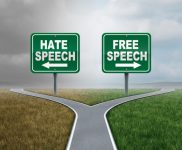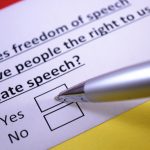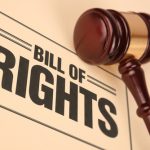Getting Tough on Hate Speech: Section 93Z of the Crimes Act 1900 (NSW)

Five years on from its initial proposal, the New South Wales Government has finally strengthened the state’s laws against hate speech.
On 21 June 2018, the NSW Parliament passed the Crimes Amendment (Publicly Threatening and Inciting Violence) Bill.
The object of the law is “to create an offence of publicly threatening or inciting violence on the grounds of race, religion, sexual orientation, gender identity or intersex or HIV/AIDS status”.
What does section 93Z say?
The Bill amends the Crimes Act 1900 by inserting a new section 93Z.
The section prescribes a maximum penalty of 3 years’ imprisonment and/or a fine of $11,000 for an individual who, or $55,000 for a company that, intentionally or recklessly threatens or incites violence towards a person (or group of persons)in public on grounds of race, religion, sexual orientation, gender identity or intersex or HIV/AIDS status.
The scope of the section is broad in so far as it is immaterial whether the perpetrator’s assumptions about the other person were correct, and violence does not need to actually occur for a prosecution to be successful.
Definitions
The section defines ‘race’ as including colour, nationality, descent and ethnic, ethno-religious or national origin.
‘Religious belief or affiliation’ means holding or not holding a religious belief or view.
‘Sexual orientation’ means a person’s sexual orientation towards persons of the same sex, or a different sex, or of the same sex and persons of a different sex.
‘Gender identity’ is defined as the gender related identity, appearance or mannerisms or other gender related characteristics of a person (whether by way of medical intervention or not), with or without regard to the person’s designated sex at birth.
While the definition of “intersex status” includes… having physical, hormonal or genetic features that are:
- neither wholly female nor wholly male, or
- a combination of female and male, or
- neither female nor male.
An essential element of the offence is that it is “public act”, which includes:
- Any form of communication (including online communications) made to the public
- Any conduct observable by the public (such as wearing clothes or displaying signs with slogans on them)
- The distribution or dissemination of any matter to the public.
The section makes clear that “an act may be a public act even if it occurs on private land”.
DPP approval
Proceedings under section 93Z can only be commenced with the approval of the state Director of Public Prosecutions (DPP).
According to NSW Attorney-General, Mark Speakman, this requirement is intended “to ensure that the offence is only prosecuted where appropriate, in accordance with the Prosecution Guidelines”.
Supersedes other laws against discrimination
The Bill repeals sections of the Anti‑Discrimination Act 1977 (NSW), including the offence of serious racial vilification under section 20D.
That section has been criticised as “ineffective”, with critics citing the fact that there has never been a prosecution under the section since it was enacted almost 30 years ago.
This is despite the President of the Anti-Discrimination Board referring several serious cases of racial vilification to the DPP over the years.
Significance of new law
It is significant that the new section is embodied in the Crimes Act, rather than anti-discrimination legislation.
This, in the eyes of many, signifies the seriousness with which such conduct is now being treated.
The increase in the maximum penalty for individuals, from $5,500 for breaches of section 20D to $11,000 and/or 3 years prison under the new section, also reflects the gravity of such conduct.
In the Bill’s second reading speech, Member of Parliament, Adam Searle, hoped this would encourage police to enforce the law rather than stand aside and leave investigations to others. In that regard, Mr Searle noted there is no longer a requirement for the Anti-Discrimination Board to investigate complaints and make recommendations.
Hate speech is not free speech
The law has been commended for sending a message that society will not tolerate speech that incites or threatens violence against others on grounds of genetic or cultural attributes.
Recognising the competing interests at play, Attorney-General, Mark Speakman, says the law has attempted to achieve a balance between free speech on the one hand, and deterring and punishing acts that encourage violence on the other.
“…these laws will help protect individuals and groups from being targeted by cowards who seek to cause physical harm to innocent people. We’re not saying people can’t have opinions or express their views, but if they cross the line into threatening and inciting violence they will not go unpunished.”
The New South Wales Council of Civil Liberties has welcomed the new law, calling it a “long overdue decision of the NSW Government to strengthen the existing law covering the offence of serious racial vilification”.
But as noted in the second reading speech, not everyone supports the change. Critics have expressed the view it represents an unjustified curtailing of free speech, or in the words of former Federal Attorney-General George Brandis’, it compromises the ideal that Australians “have the right to be bigots”.
Free speech is indeed a fundamental tenant in any liberal democracy. And if the sole purpose of section 93Z was to suppress repulsive ideas or distasteful speech, many civil libertarians would oppose the law for its unwarranted interference.
But as Newton Lee famously pointed out, there is an important distinction between free speech and hate speech: “free speech encourages debate whereas hate speech incites violence”.
Many believe that the law should interfere only where free speech endangers the rights or safety of others.
This is consistent with international law, which Australia adheres to, including the International Covenant on Civil and Political Rights (ICCPR). Article 20 of the ICCPR provides:
“Any advocacy of national, racial or religious hatred that constitutes incitement to discrimination, hostility or violence shall be prohibited by law”.
Only time will tell whether section 93Z will live up to its expectations or be a primarily symbolic and ineffective law, like former section 20D of the Anti‑Discrimination Act.






